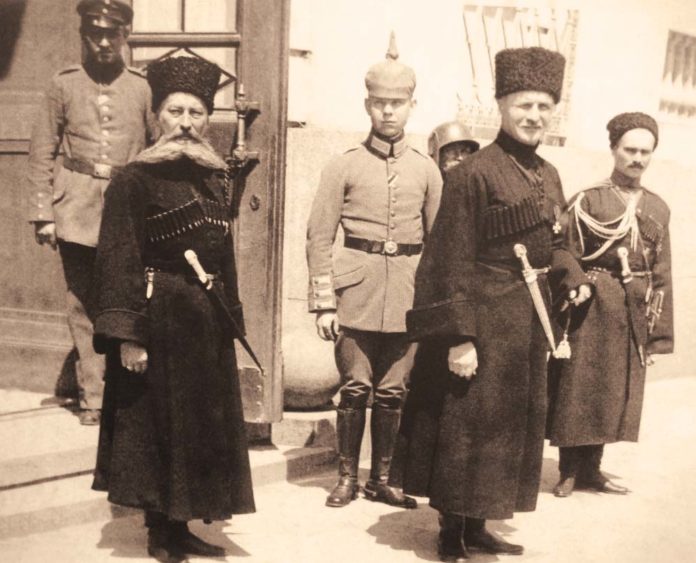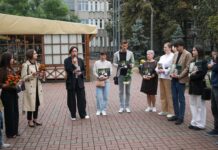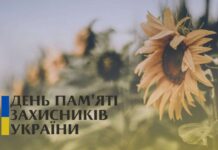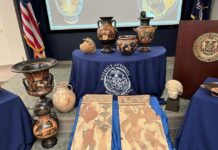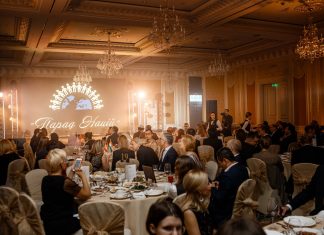2017 witnessed the 100th anniversary since that moment when the stubborn and almost desperate struggle for the independent statehood broke out in Ukraine.
2018 will witness the 100th anniversary of one of the most controversial, tragic and crucially important periods of this struggle at the same time.
We mean the right-conservative coup d’état in Ukraine initiated and headed by ex-general of the imperial Russian Army, landlord-tycoon and descendant of the old noble family Pavlo Skoropadsky.
This event is regarded to be as one of the most controversial ones in the Ukrainian history and keeps provoking the fierce discussions not only among politologists and historians.
We are not going to overload our readers with historical facts. We just want to try to analyze the causes and the after-effects of the 100-year-old event as well as the actuality of this coup d’état in the modern Ukraine.

So, Pavlo Skoropadsky seized the power on April 28th 1918. Former General-Lieutenant of the imperial Russian Army proposed his knowledge and military experience for the newly formed Ukrainian state when the last Russian Emperor Nikolay the Second had abdicated and Russian Empire had broken down. He was a commander of the one of the most powerful army corps of the Russian Armed Forces that started to fall apart in 1917. Nevertheless, in his corps the strict discipline and the high combat capability were preserved. His corps took active part in the disarmament of the pro-Communist military units that were inclined to seize Kyiv already in October or November 1917.
Tsentralna Rada (Central Council — the Parliament) the only one legitimated state body of Ukraine then thanked to general in a rather odd way. From one side he was appointed as the commander of the Ukrainian Armed Forces in Central Ukraine but from other side he faced the intrigues and artificial obstacles when he began to set up professional and combat capable Ukrainian Army.
Tsentralna Rada consisted mainly of the representatives of the socialist and populist political parties and owing to this their attitude to the former imperial general, who was a commander of the horse guard regiment subunit of the last Russian Emperor and knew the Emperor personally (the Emperor was for the Tsentralna Rada politicians the enemy and the oppressor of the Ukrainians). could not be friendly anyway.

The attempt of the general Skoropadsky to set up his own military formation that could protect Ukraine without any interference of Tsentralna Rada politicians was a successful one. He proposed to create the so-called “Independent Cossakhood”, the mighty militia that could carry out the functions of the army and of the police.
Constituent congress of the “Independent Cossakhood” took place on 6th of October 2017 in the town of Chyhyryn and Pavlo Skoropadsky was elected as the Main Commander of the “Independent Cossakhood” at it. This election finally destroyed any possibility of his collaboration with Tsentralna Rada but at the same time his new position made him very popular and very respectful amidst the supporters of the Cossakhood renaissance in Ukraine.
Actually the election of Skoropadsky as the Cossacks chieftain was caused by the fact that has ancestor hetman Ivan Skoropadsky ruled Ukraine in the 18th century just after the exile of Ivan Mazepa another legendary ruler of Ukraine.
Since the election and up to seizure of the power in the April of the 1918, Skoropadsky was a witness of the tragic episodes for Ukraine — he could see the defeat of the Ukraine Peoples Republic (UPR) headed by Tsentralna Rada, the signing of the of the Treaty of Brest-Litovsk with Germany, the entering of the German Army into Kyiv and total incapability of the Tsentralna Rada to set up just any similarity to the complete state apparatus.
Tsentralna Rada, not wanting to create the own armed forces, had to ask Germany for help.
The German Army liberated Ukraine from the Bolsheviks, demanding, in the form of a fee for dismissal, the supply of Ukrainian food to Germany. The Central Rada was unable to ensure the collection and supply of food, and therefore the German military in Ukraine and the Kaiser Wilhelm II in Berlin began to feel the need for other allies in Ukraine.

Such allies could be found among the representatives of the great Ukrainian bourgeoisie and large Ukrainian landowners and Skoropadsky was one of them. These people had a number of their own political parties that were not part of the Tsentralna Rada and their group had the ideologist — Vyacheslav Lipinsky, a historian, philosopher and prominent academic opponent of Mykhailo Hrushevsky. In the beginning of April 1918, they began negotiations with the German command in Ukraine and created a kind of alternative to the Tsentralna Rada — the so-called “Ukrainian People’s Community”.
Skoropadsky was appointed as the political frontman of this movement — so to say. On April 28th 1918, the Central Rada was dissolved with the help of German armed units. This dissolution was preceded by the so-called “congress of farmers”, in fact — by large landowners, due to who Pavlo Skoropadsky was elected as the Hetman of All Ukraine. The Republican form of government was abolished, all power concentrated in the hands of Hetman, Ukraine became a monarchy and changed its official name. The Ukrainian People’s Republic was replaced by the Ukrainian State.
It had been lasting for nine incomplete months only, but during this time Hetman Skoropadsky, based on the Russian Empire state officials and managers of Ukrainian origin, formed a full-fledged state apparatus. Also, the following significant steps were taken in the revival of Ukrainian culture and education:
- the Ukrainian Academy of Sciences was created;
- National Art Gallery was open;
- two universities were opened — in Katerynoslav (modern Dnipro) and in Kamyanets-Podilsky;
- University of St. Volodymyr in Kyiv was obliged to instruct the students in Ukrainian language.
In addition to universities, the government of Skoropadsky actively opened Ukrainian colleges and at these colleges the compulsory academic disciplines were Ukrainian language, Ukrainian history, geography of Ukraine, and Ukrainian folklore.
The diplomatic service of the Ukrainian State was also much more effective than the diplomatic service of the UPR.
The Ukrainian state of Skoropadsky had been recognized by more than 30 countries in the world. At the diplomatic service people with the ties in the royal courts of Europe, that seriously facilitated and simplified the process of international recognition of the Hetman state, were involved.
In spite of some opposition from the German military command, the Ukrainian armed forces were actively developing. There were created 8 infantry corpses consisting of 54 infantry and cavalry regiments, 48 artillery and 38 heavy artillery regiments as well.
The cause for the death of the Ukrainian State was an unfavourable change in the geopolitical situation — the fall of 1918 began the collapse of Austria-Hungary, and in November of that year the revolution in Germany broke out.

The German troops left the territory of Ukraine and the Hetmanate authorities faced the problem to find the new allies.
Taking into consideration that the diplomatic corps of the Ukrainian state, where every second to third diplomat had either a Baronian title or studied in the United Kingdom, had good education and a high level of professionalism, there would not be a huge deal to establish normal relations with the Entente states that defeated Germany. However, Entente, especially France, had one condition: Ukraine would have to establish normal ties with anti-Bolshevik Russia.
The Hetman government agreed to this by issuing an appropriate document that by then opposition — the socialist parties from the dispersed Central Rada — was regarded as a document of a federation with the anti-Bolshevik Russia. Thus, this document became the reason for the anti-Hetman uprising and the capture of power by representatives of the left Ukrainian parties.
Hetman’s government and the system of state administration that were in a state of formation failed to suppress this uprising, moreover, many representatives of the Hetman administration turned to the side of the rebels. As we see, the tradition to hate the ruling power is quite old in our country.
Unfortunately, the Ukrainian “leftists“ that came to power after Skoropadsky proved to be unable to hold this power. They got a war on three fronts — against the Entente, against White Russia, against Red Russia and finally they lost this war. The Ukrainian state-building was postponed until 1991.
— Despite numerous mistakes and miscalculations, the time of the Ukrainian State was the period of the greatest detection of Ukrainian creativity in the sphere of political, economic, cultural and educational construction
Thus, a prominent Ukrainian historian Dmitry Doroshenko, who headed the Foreign Policy Department of the Ukrainian State from June to October 1918, wrote in his memoirs being in exile.
However, despite the bitter experience of numerous defeats in 1917–1921, despite the difficult formation of Ukrainian statehood, in the 1990s and 2000s, nowadays we can say that Ukraine has occupied its independent place under the sun. The successes of our state at the international arena and further progress on the path of European integration have shown that the abortive experience of our predecessors, including the founders of the Ukrainian state — 1918, has been taken into account.




